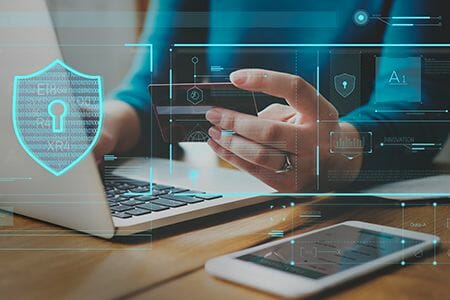Avoiding Coronavirus Scams

Scams are always something to look out for, but right now is a good time to be extra vigilant. Many scammers are taking advantage of people’s fear, anxiety, and general uncertainty about the coronavirus and the economic impact of the pandemic. Here are some current scams, things to look out for, tips to avoid being scammed, and resources:
Checks from the Government
There have been many conversations surrounding checks or a direct deposit coming from the government as a form of relief during this tough time. As of right now, the details are still being worked out. Here are some reminders from the Federal Trade Commission about receiving this relief:
- To receive this relief you will never have to pay any up front fee or charge to the government.
- The government will never call you to ask for your Social Security number, bank account, or credit card number. Anyone who calls asking those questions is a scammer.
- Reports of checks are not yet a reality, and once approved they will likely not appear until late April or early May. Anyone telling you that you can get your money now is a scammer.
No matter what the end result of this relief will be the government will never ask you to pay up front to receive it. Anyone who asks you to do so is a scammer and should be reported to the Federal Trade Commission at: www.ftc.gov/complaint.
Social Security Suspension
The Inspector General of Social Security warns that there are fraudulent letters threatening the suspension of Social Security benefits due to COVID-19 related office closures. The Social Security Administration (SSA) will not suspend or discontinue benefits because offices are closed. The fraudulent letters try to trick victims into calling a phone number referenced in the letter. Benefits will not be suspended. Any communication you receive that says SSA will do so is a scam and should be ignored.
Social Security will never:
- Threaten you with benefit suspension, arrest, or other legal action unless you pay a fine or fee
- Promise a benefit increase or other assistance in exchange for payment
- Require payment by retail gift card, cash wire transfer, internet currency, or prepaid debit card
- Demand secrecy from you in handling a Social Security-related problem
- Send official letters or reports containing personally identifiable information via mail
If you receive a letter, text, call, or email that you believe to be suspicious hang up and do not respond.
False Health Agencies
Be vigilant! Scammers are now sending fake emails pretending to be the Centers for Disease Control and Prevention (CDC), the World Health Organization (WHO), or experts saying they have information about the virus. Some scammers are even making up agencies, like “The Health Agency” to try and get you to click links, download files, or give them your financial information. For the most up-to-date information about the Coronavirus, you can visit the CDC’s website at www.cdc.gov or the Oregon Health Authority at www.oregon.gov/oha.
Offers for vaccinations, treatments, & equipment
Be sure to ignore online offers for vaccinations or treatments for COVID-19. There are currently no FDA approved vaccines, pills, cough drops, or other products available to treat or cure COVID-19 online or in stores. Do not give these scammers your financial information.
Be aware of counterfeit products such as sanitizing products and Personal Protective Equipment (PPE), including N95 respirator masks, goggles, face shields, protective gowns, and gloves. You can learn more about unapproved or counterfeit PPE can be found at www.cdc.gov/niosh.
Donation Requests
Be sure to do careful homework when it comes to donation requests through charities and crowdfunding websites. Don’t let anyone rush you into making a donation, and if someone wants donations by cash, gift card, or by wiring money – don’t do it.
Phishing and Robocalls
Scammers will try to trick you into giving your personal information – Social Security Number, credit card number, financial institution information, etc. – by creating fake emails and texts to trick you. Don’t click the links or download the attachments. Double check the email address and phone number these come from.
Scammers are using illegal robocalls to try and pitch scams of all sorts. What do you do when you get one of these? Hang up. Do not press any numbers, answer their questions, or give them any information.
Don’t let fear win
This time can be scary, but it is important to do your homework and be careful with your personal information. Remember, Clackamas and the government will never email, text, or call you to ask you for this information. If you encounter any of these scams and aren’t sure what to do, reach out. Give us a call at (503) 656-0671 or fill out our contact form by clicking here. Our Member Advocates are here to help.
